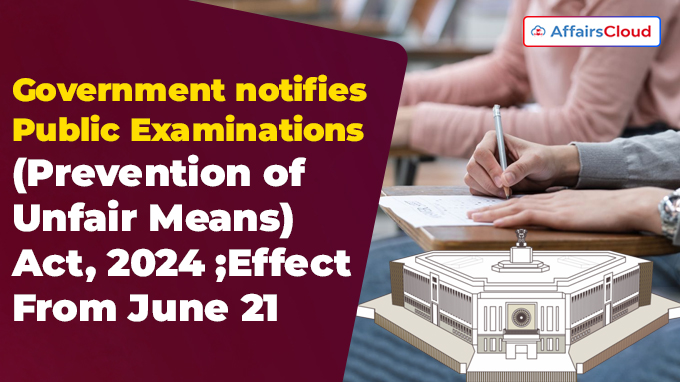 The Department of Personnel and Training (DoPT) under the Ministry of Personnel, Public Grievances and Pensions (MoPPG&P), Government of India (GoI) in exercise of powers given under sub-section (2) of section 1 of the Public Examinations (Prevention of Unfair Means) Act, 2024 (1 of 2024) has notified that all the provisions of the said Act came into effect from 21st June 2024.
The Department of Personnel and Training (DoPT) under the Ministry of Personnel, Public Grievances and Pensions (MoPPG&P), Government of India (GoI) in exercise of powers given under sub-section (2) of section 1 of the Public Examinations (Prevention of Unfair Means) Act, 2024 (1 of 2024) has notified that all the provisions of the said Act came into effect from 21st June 2024.
- The Act aims to prevent unfair means in public examinations and common entrance tests held across India. All offences will be cognizable, non-bailable and non-compoundable under this Act.
- The Act consists of 19 sections across 6 chapters which deal with the various aspects of public examination to ensure transparency and credit of the exams conducted by public authorities.
Background:
i.The Act was 1st introduced by the Union Minister of State (MoS) Dr. Jitendra Singh, (MoPPG&P) as Public Examinations (Prevention of Unfair Means) Bill, 2024 in the Lok Sabha (Lower House of the Parliament) on 5th February, 2024 during the Interim Budget session of the Parliament and was passed in Lok Sabha on 6th February, 2024.
ii.Later, the Bill was passed by Rajya Sabha (Upper House of the Parliament) on 9th February, 2024.
iii.The President of India, Droupadi Murmu gave assent to Public Examinations (Prevention of Unfair Means) Bill, 2024 on 13th February, 2024.
Features of the Act:
Public Examination:
Section 2(k) of the Act defines “public examination” any examination conducted by authorities specified under the schedule of the said Act or notified by the central government, these include:
- The Union Public Service Commission (UPSC), Staff Selection Commission (SSC), Railway Recruitment Board (RRB), National Testing Agency (NTA), Institute of Banking Personnel Selection (IBPS), and the Departments of the central government and their attached offices for the recruitment.
Unfair Means:
Section 3 of the Act outlines minimum 15 actions that amount using unfair means in public examinations “for monetary or wrongful gain”. It aims to prohibit collusion or conspiracy to facilitate indulgence in any unfair means, these include:
- Unauthorised access or leakage of question paper or answer keys.
- Assisting a candidate during a public examination
- Tampering with computer network or resources.
- Tampering with documents for shortlisting of candidates or finalising the merit list or rank of a candidate in public examination.
- Conducting fake examination, issuing fake admit cards or offer letters to cheat or monetary gain.
Key points:
The Act also prohibits disclosing exam-related confidential information before time and an unauthorised people from entering exam centres to create disruptions.
- All these offences are punishable under section 10 with imprisonment of minimum 3 years which may extend to 5 years, and a fine up to Rs 10 lakh.
- If he/she fails to pay the fine, an additional punishment of imprisonment shall be imposed, as per the provisions of the Bharatiya Nyaya (Second) Sanhita, 2023(BNS2).
Service Providers:
Section 2(n) defines “service provider” to mean any agency, organisation, body is engaged by the public examination authority for the conduct of the public examination.
- It is mandatory on part of service provider to report to the police and the concerned examination authority, in case it found any person or group of persons or institution commits any offence or unfair means under section 3, 4 and 5 of the act. Failure to report such incidents will be considered an offence.
- It prohibits service providers from shifting the exam centre without permission from the examination authority.
Penalty:
As per the section 10 (2) under Chapter III of the Act, an offence by a service provider will be punishable with fine up to Rs 1 crore and proportionate cost of examination will also be recovered from such a service provider.
- Service provider will also be barred from conducting any public examination for a period of 4 years.
Organised crime:
The Act defines organised crime as an unlawful act committed by a person or a group of persons to further a shared interest for wrongful gain in relation to public examinations.
- The Act has provision to punish persons who commits an organised crime with imprisonment between 5 years and 10 years, and a fine of minimum Rs 1 crore.
- Also, if an institution found guilty of committing an organised crime, its property will be attached and forfeited, and a proportionate cost of the examination will be also recovered from it.
Other Keyfacts:
i.The Act mandates an officer not below the rank Deputy Superintendent or Assistant Commissioner of Police will investigate the offences under the Act.
- As per Section 12 (2) sub section (1) of the Act, the central government may transfer the investigation to any central investigation agency.
ii.The Act specifies that “candidates” would not be liable for action within its purview and would continue to be covered under existing administrative provisions of the Act
iii.No action will count as an offence if it is proved that the accused had exercised due diligence.
About Ministry of Personnel, Public Grievances and Pensions (MoPPG&P):
Union Minister– Narendra Modi (Lok Sabha constituency- Varanasi, Uttar Pradesh (UP))
Union MoS– Dr. Jitendra Singh (Lok Sabha constituency- Udhampur, Jammu & Kashmir (J&K))




